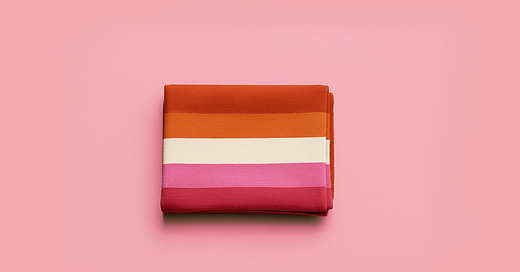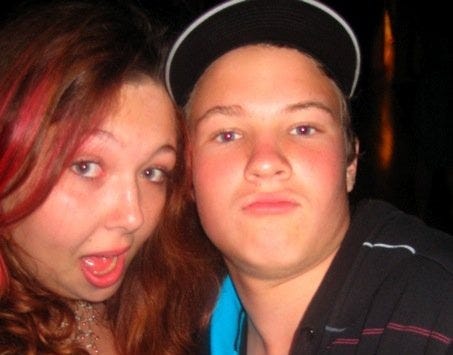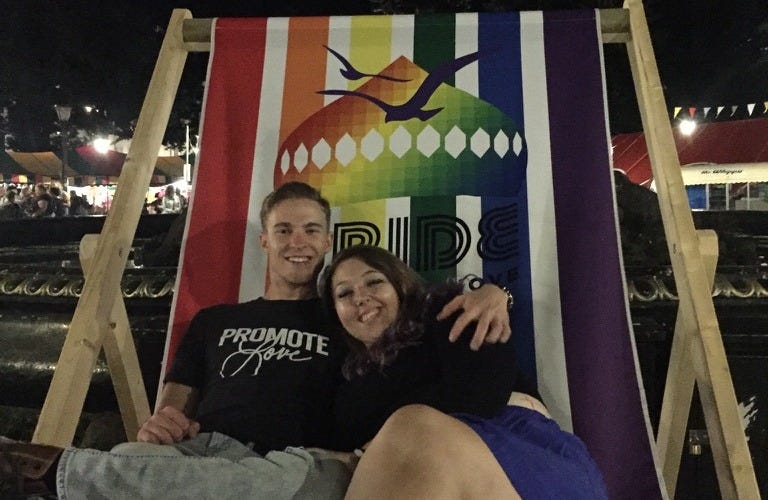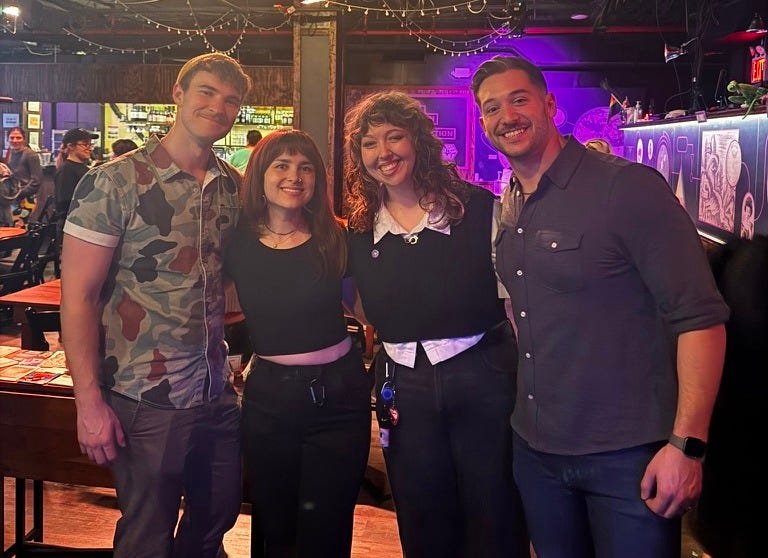Hi friends, and happy Wednesday!
This past Saturday was Lesbian Visibility Day, so I wanted to do something special to celebrate that. I reached out to interview one of my dearest, long-time friends, Marena Faye, who created Sapphest, a Sapphic play festival that has been creating beautiful art and community at a time when we need it most. It’s a really lovely interview, and if you read all the way to the end, you’ll get some fun photos for today’s Sweet Treat.
Something I learned during our talk together is that usage of the term Lesbian is actually shrinking, being replaced by Queer, Pan, and other identifiers for a myriad of reasons we get into later. This proves why Lesbian Visibility is so critical today. Lesbians have been at the forefront of the fight for LGBTQ+ civil rights, showed up for gay men during the AIDS crisis, and rarely get the attention they deserve for their incredible contributions. Just look at how few U.S. lesbian bars there are (around 25) compared to U.S. gay bars (around 850). Lesbian visibility is vital.
If you’re new here, I hope you take a moment to consider subscribing for more LGBTQ+ content, some really exciting future interviews, and more community building! Let’s jump in!
GB: So, Marena, I’ve been lucky to know you for almost 20 years, and over that time, both of our sexualities have evolved quite a bit. Can you tell me a bit about that evolution for you? What it’s looked like and what it’s taught you.
MF: 20 years, wow. Well, I knew I wasn’t straight when I was 10. I had a crush on my best friend and tearfully told my (wonderfully supportive) mom I was a lesbian. Then, in middle school, I learned about bisexuality and thought that was a fitting label for me. During my freshman year of high school, I had my first relationship with someone who identified as female. After that ended, I found myself continuing to have big feelings for people of all genders, which I would now consider queer, but didn’t have that vocabulary then.
When I got to college, I found myself gravitating towards men because it felt easier and less painful to be straight. A friend kept telling me they thought I was queer, but I pushed it away because I was scared of what that meant in Allentown, PA. Then one night at our local bar (called Stonewall, of course), that person and I spent the night together and realized I DEFINITELY wasn’t straight. I started identifying as lesbian, but even that didn’t feel quite right.
After college, I dated someone who identified as female, then discovered he was trans a year into our relationship. As his gender changed, my own sexuality did too and I started identifying as Queer. We were together for 3 years, and after that relationship ended, I met another person abroad who also coincidentally discovered he was trans during our relationship. We were together for 6 years and even got married and during that relationship, I realized I was nonmonogamous. Our relationship ended in 2022, and since then, I have met my life partner, who is a bisexual cis man (the first cis man I’ve ever dated)! We are poly, and I have two other partners, one woman and one enby person! I very much identify as queer and feel very proud to carry that identity.
Everyone’s journey is different. There were times in my life when I felt upset or anxious about liking women, and other times when I felt that way about liking men. There were times when I didn’t feel “queer enough” or like I was “too queer.” But now, I feel confident in who I am, and am proud to be creating spaces where others can celebrate who they are, too!
GB: Speaking of those spaces, there has been a rise in Queer spaces recently, but lesbian specific spaces are shrinking. Why do you think Lesbian Visibility is so important in today’s Queer culture?
MF: Lesbian visibility is important because there’s still a lot of stigma around the word “lesbian.” In recent years, a lot of iconic LGBTQ+ figures, who do not identify as men, have been choosing to identify as “queer” instead of lesbian. This can be because that identity feels truer to them or because “lesbian” has been so heavily sexualized by straight men and misunderstood by the broader culture.
When people today use the word “lesbian” to identify themselves, it carries powerful connotations of resistance, strength, and pride. Celebrating lesbian visibility is about reclaiming and honoring an identity that has often been pushed aside, even within the LGBTQ+ community. Lesbians ARE visible, y’all!
GB: For my readers who are allies, what would you tell them are good ways to support lesbians and all Queer folk right now?
MF: The best thing you can do is understand how our rights could be taken away from us right now, as so many marginalized groups face persecution. Ask how we’re doing. Support our art and our work. Stand up for all LGBTQ+ folks (big emphasis on the T) when we aren’t around. When you hear someone misgender someone, correct them! It’s so helpful when this happens outside of queer spaces and by allies!
GB: You’ve recently started doing some incredible work that enhances, not only Lesbian visibility, but all sorts of Sapphic stories with your Sapphic Play Festival: Sapphest. Can you tell us a little bit about how Sapphest came to be?
MF: I wanted to cultivate a space for Sapphic voices for a long time, but it wasn’t until I saw Lempika on Broadway that Sapphest really started to take shape. Seeing this relationship on Broadway inspired me, but left me frustrated by the lack of Sapphic representation in theatre.
I also found during my time as an applied theatre artist that there are a lot of LGBTQ+ theatre spaces that do not typically center the voices of Sapphic artists, so I wanted to create a space that did that. Within a month, Mary Kamitaki (associate producer and another best friend from high school) and I had our entire first installment planned, and it came to life two months later!
GB: For those who don’t know, who was Sappho, and what does Sapphic actually mean?
MF: Sappho was a Greek poet from the island of Lesbos (around 630 to 570 BCE). She wrote poems about love, desire, and lust between women. At all our events, we have a giant neon sign that says “Sappho was here” as our way of honoring Sappho and a reminder that Sapphic stories, love, and creativity have always existed, and always will.
In our context, we use Sapphic as an inclusive term for folks identifying as women, nonbinary, trans, two-spirit, genderqueer, and agender who experience love or attraction for others within these communities. Sapphics may identify as queer, bisexual, pansexual, asexual, aromantic, lesbian, or something else.
The word’s broadness actually takes the pressure off the word being for one specific group of people, as so many folks can identify as Sapphic! It’s not only an identity. It is also a community, a culture, and a celebration of both softness and strength, decadence, revelry, and ethereal beauty. It reflects a way of moving through the world with deep emotion, tenderness, and sacred connection.
GB: What has been the most surprising part about Sapphest?
MF: The way the community has shown up in droves. Producing my first play festival was a huge undertaking, and I was so moved by how the community completely lifted me up and carried me through this experience.
What touches me the most is seeing the same people showing up event after event, bringing new people with them every time, and growing this community. We’ve sold out every event and have grown to 1,900 followers in 9 months! I feel so filled with gratitude reflecting on this.
GB: Sometimes, a big barrier to enter queer spaces is nerves. What would you tell a baby Queer who’s too nervous to attend an event like Sapphest?
MF: I’ve had people reach out to me saying they really want to attend our events, but do not have anyone to go with. They ask me if they should still go, and my answer is always YES. This is your space just as much as it is for someone who has identified as Sapphic for most of their lives.
At our events, you can always walk up to someone and say, “This is my first sapphic/queer event and I’m nervous.” If that feels too intimidating, find one of the Sapphest organizers (like me—I’ll probably be yapping on a stage) and let us know that you’re alone, and we’ll have your back! We are so excited for you to experience the love and magic that this community has to offer. You belong here, babe!
GB: Lastly, what’s next for Sapphest, and how can people stay in touch?
MF: We have an (almost sold out) drag show on May 8th at the historic Stonewall Inn hosted by drag king extraordinaire Theydy Bedbug! Then on May 20th (you heard it here first!) we will have our first Pride Party at Anything Brklyn where we will dance our gay little hearts out, and then finally, July 19th and 20th will be our 3rd installment of Sapphest at Brooklyn Art Haus!
Follow us on Instagram at @sapphestnyc! That’s where we announce when play and audition submissions are open, share upcoming events, and connect with the community. You can also sign up for our newsletter to get first access to event tickets, special promo codes, and exclusive updates.
And exciting news!!! We are launching our website in May, which was created in collaboration with Gay Buffet’s very own Aidan Wharton!
Come be part of the magic. We are just getting started!
GB: Thank you so much for being here. I love you so much Marena!
MF: Thank you for having me! I love you so much and I’m so thrilled to be making queer art and telling queer stories alongside you!
As promised, today’s Sweet Treat is a collection of some incredible photos of me and Marena. Enjoy!
Well folks, that’s all from me this week! I hope you enjoyed this new format, stay tuned for some more coming down the line!
As always,
If you’re new here and enjoying this so far, this is your sign to subscribe! I write queer stories, reflections, good news, and real things you can do to stay involved. It’s all about kindness, hope, and critical thinking here at Gay Buffet. Subscribe Below!











My son is trans and I have have several lesbian friends. Only 1 announced Lesbian Day of Visibility on her IG. I was wondering what the shift was. Thanks for this content 🙏🏼
This made me cry happy tears. Thank you for your work, your inclusion of all Sapphics, and that you’re so willing to help new Sapphics at your events.
I’m in Idaho, non-binary and prefer women but will date queer males.
It’s hard out here to be any type queer. All our bars (only queer spaces we had) are being taking. It gets kinda lonely sometimes because the people here like those hard line definitions. The gay men (not all) can be extremely and dangerously conservative. They’re normally hateful to lesbians. Bisexuals and trans are looked down and shut out by both gays and lesbians.
I’m thankful that there are other communities that are more accepting and inclusive. Gives me hope because I feel we all need each other to get through these dark times.